isis
1. I Went to Church with Bruce Jenner, and Here’s What Caitlyn Taught Me About Jesus
“Caitlyn knows who Jesus is, and Jesus knows her by name. Whether that sits comfortably on a timeline or blog comment, I know firsthand that Caitlyn has heard the good news. And, Caitlyn has taught me more about Jesus.”
2. And the Award for Trailblazing Feminist Icon Goes to — Miss Piggy
The Sackler Center for Feminist Art awarded the Muppet with its First Award, which recognizes women for being first in their fields and has included the likes of Sandra Day O’Connor, because the character has “qualities that … women need to have to face the world as it is, and she gives us a good smile on top of it all.”
3. In Baltimore Schools, Free Meals for All
"Given the socio-economic status of the city, it's a no-brainer," [parent David T.] Clements said of the program. "Parents can now take that money and apply it to their futures."
4. Study Finds Global Warming Hasn’t Slowed
The latest study, published in Science, reverses previously held thought that global warming was on hiatus. Not so, according to the numbers, which were based on what the scientists say is more accurate land and sea temperature measurements.


What we have yet to hear from Republican presidential candidates or the habitual hawks is the appropriate spiritual response to the war in Iraq — repentance. Instead, we hear this defensive language: “Everybody got it wrong.” Well that’s not true. The people who ultimately made the decision to invade, occupy, and completely destabilize Iraq did indeed get it wrong. But so far, they have been unwilling to admit their incredible mistakes that we all now have to live with: the enormous number of lives lost or permanently damaged; the extremely dangerous exacerbation of the sectarian Sunni/Shia conflict that now rules the entire region; and the creation of the conditions that led to ISIS. Except for Rand Paul, none of the Republican candidates has been willing to admit that ISIS is a consequence of our complete devastation and destabilization of Iraq — leaving us with the greatest real threat the international community has faced for some time. Yet we’ve heard not a word of apology for mistakes or any spirit of repentance from the neoconservative hawks.
THE SO-CALLED WAR on terror has dangerous and shifting financial front lines. Since the 9/11 attacks, a series of “anti-terrorism financing laws” have been enacted that allow the government to designate certain charities as “terrorist” organizations or as financing terror. The government can effectively shut down organizations without ever bringing criminal charges or providing evidence against them, according to the ACLU. “As a result,” it reported, “American Muslim organizations and individuals are unfairly targeted.”
In addition to fostering Islamophobia in the larger society and fear within Islamic and other faith communities, overzealous application of these laws can actually inhibit the war on terror. It risks crippling the very Islamic charities that can effectively combat radicalization in places vulnerable to extremists. Stephen Bubb, head of a charity network in Britain, where financial terror laws are similar to those in the U.S., has emphasized “sensible, credible, proportionate regulation” of Islamic charities. “I have witnessed firsthand the difficulties faced by organizations in Pakistan fighting the same battle that we are: for security, for a better way of life, and for a better future for our children,” said Bubb.

How does this kind of mentality take hold of a state of nearly 30 million, at least to the point that the governor himself would take official action?
One word: fear. Actually two words: fear and ignorance.
Though it comes off as cartoonish and ridiculous to the typical onlooker, fear and ignorance are, in fact, powerful tools. And using fear based on a broadly shared perception — regardless of actual evidence — is something all too familiar to modern-day Christianity in the United States as well. And the reason it hangs around like heartburn after a double bean burrito is because it works.
Here’s how.
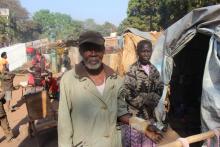
Despite much gloom and doom, there were a few silver linings in the report. Religious freedom and harmony have improved in Cyprus, resulting in greater access to houses of worship across the Green Line separating north from south. Nigeria witnessed its first peaceful democratic transfer of power earlier this year when Muslim northerner Muhammadu Buhari ousted Christian southerner Jonathan Goodluck at the polls. And Sri Lanka’s new government has taken positive steps to promote religious freedom and unity in the face of violent Buddhist nationalism.

The arrests of six Minnesota men accused earlier this month of attempting to join the Islamic State group highlights an unprecedented marketing effort being waged by the militant group in Iraq and Syria, U.S. law enforcement officials and terror analysts said.
It’s a campaign that is finding resonance from urban metros to the American heartland.
“This is not so much a recruitment effort as it is a global marketing campaign, beyond anything that al-Qaida has ever done,” said a senior law enforcement official.
The official, who is not authorized to comment publicly, said the Islamic State’s slick multimedia productions, its use of social media, and personal “peer-to-peer” communication are proving to be effective parts of a sophisticated program aimed at the West.
“I don’t think there has been one case in which we haven’t found some connection to the videos or other media the group has produced,” the official said.
Federal authorities have identified more than 150 U.S. residents who have sought to join the ranks of the terror organization or rival groups in Syria. There is evidence that about 40 of those have traveled to the region and returned to the U.S. Most have been charged; an undisclosed number are free and subjects of intense surveillance, the senior official said.
The smallest subset of the group, an estimated dozen, represents those who have actually joined the fighting ranks.
1. Drone Strikes Reveal Uncomfortable Truth: U.S. Is Often Unsure About Who Will Die
Following the president’s admission this week that two Western hostages were killed in a drone strike in Pakistan, protestations against the veiled drone program have re-escalated. “Every independent investigation of the strikes has found far more civilian casualties than administration officials admit. Gradually, it has become clear that when operators in Nevada fire missiles into remote tribal territories on the other side of the world, they often do not know who they are killing, but are making an imperfect best guess.
2. Infertility and the Role of the Church
This week is Infertility Awareness Week. Writer Rachel Marie Stone dives into some of the attitudes about infertility and reproductive technologies in the church.
3. Meet Your New Attorney General
After postponing a vote for more than five months to fight along party lines over abortion language in a human trafficking bill, the Senate voted Thursday to approve the nomination of Loretta Lynch, 55, making her the first black woman to head up the Justice Department.
4. Those Countries at the Top of the World Happiness Report Also Have Great Press Freedom Rankings
See what country falls where and read more about the correlation.

The destruction and looting of art and historical sites in Syria is "the worst cultural disaster since the Second World War,” according to anthropologist Brian L. Daniels.
The human losses are devastating: At least 210,000 people have died in the ongoing battle between the Assad regime and the Syrian rebels. ISIS has joined the violence and exploited the instability in the country, taking control of large parts of northern and eastern Syria.
And now, in the unofficial war over Syria’s cultural heritage, art is the main casualty. As of September 2014, five out of six of Syria’s Word Heritage sites had been destroyed including Aleppo’s 12th century Umayyad mosque.
ISIS’ ruthless participation in the Syrian conflict only increases the danger to Syrian art and history: In ISIS controlled Mosul, Iraq, art, music, and history have been removed from school curriculum. In February, ISIS released a video of its fighters smashing ancient statues and artifacts in the Mosul museum in an effort to weed out “heresy,” prompting the UNESCO Director-General to call for an emergency meeting with the Security Council to advocate for the “protection of Iraq’s cultural heritage as an integral element for the country’s security.”
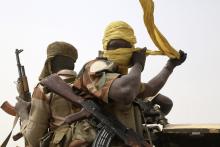
Boko Haram’s leader has pledged allegiance to the Islamic State in a new audio message, according to a group that monitors extremist activity.
In the recording, a man claiming to be Abubakar Shekau, leader of the Nigerian terrorist group that has killed thousands, vowed to follow Islamic State leader Abu Bakr al-Baghdadi, the U.S.-based SITE Intel Group, announced on March 7.
“We announce our allegiance to the Caliph of the Muslims … and will hear and obey in times of difficulty and prosperity, in hardship and ease, and to endure being discriminated against, and not to dispute about rule with those in power, except in case of evident infidelity regarding that which there is a proof from Allah,” Shekau said in a tweeted message that went along with the video, according to the Associated Press. Al-Baghdadi is the self-proclaimed head of the caliphate.
Flashpoint Intelligence, a global security firm, confirmed the recording to NBC News and said it was posted on Boko Haram social media accounts. USA Today was not able to independently verify the message.
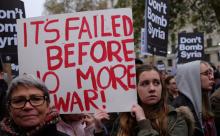
THE PEACE MOVEMENT needs a stronger response to the threat posed by the Islamic State in Iraq and Syria. It is not enough merely to oppose deepening U.S. military involvement. We must also identify viable diplomatic and political options for countering the ISIS danger and reducing violence in the region.
President Obama has said there is no military solution to the crisis in Iraq, but his administration has relied heavily on bombing as its main response to ISIS. Since August, the United States and about a dozen other states have launched more than 1,900 air strikes against ISIS and militant groups in Iraq and Syria. Approximately 80 percent of the strikes have been conducted by U.S. forces, mostly jet fighters but also armed drones. The strikes have had the effect of halting further ISIS encroachments into Iraq and have enabled Kurdish fighters to regain some ground in the northern part of Iraq. In Syria, however, ISIS reportedly has continued to gain ground despite the U.S.-led attacks.
U.S. military involvement in Iraq and Syria is having unintended effects that could make matters worse. Battling the United States gives ISIS a transcendent objective beyond its political agenda in Iraq and Syria and distracts local attention from its brutal policies. It allows ISIS to portray itself as the victim and to claim that it is defending Islam from Western attack. After the start of airstrikes in August, support for the group increased. The strikes in Syria have also targeted the al Nusra Front and have generated pressure for rival groups to close ranks. Unlike al Qaeda, ISIS has not declared war on the United States, but it may now rethink its strategic focus and plan attacks on the “far enemy,” to use al Qaeda’s term.
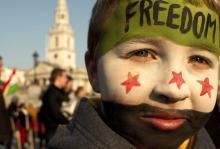
IN JULY 2013 in Raqqa, the first city liberated from regime control in northeastern Syria, a Muslim schoolteacher named Soaad Nofal marched daily to ISIS headquarters. She carried a cardboard sign with messages challenging the behaviors of members of the Islamic State of Iraq and Syria as un-Islamic after the kidnapping of nonviolent activists. After Nofal was joined by hundreds of other protesters, a small number of activists were released. It is a small achievement, but an indication of what communities supported in responsible ways from the outside could achieve on a larger scale in areas controlled or threatened by ISIS.
In the fight against ISIS, unarmed civilians would seem to be powerless. How can collective nonviolent action stand a chance against a heavily armed, well-financed, and highly organized extremist group that engages in public beheadings, kidnappings, and forced recruitment of child soldiers and sex slaves? One whose ideology sanctions the killing of “infidels” and the creation of a caliphate?


A couple of folks I really respect – Kate Gould of Friends Committee on National Legislation (aka, the Quaker Lobby), and Jim Wallis of Sojourners – were recently on the O’Reilly Factor. For those of you who don’t watch cable news, this is a television program where Bill O’Reilly basically screams at people and incites hatred of anything non-white, non-rich, and non-Republican. I normally don’t watch the show. But when I heard that Kate and Jim were going to be talking, I tuned in.
I knew almost immediately this wasn’t going to be good. It’s Bill’s program, so he gets to frame the question. Here’s what he asks: Do Christian pacifists have a solution for stopping ISIS?
It’s the wrong question.

Southern Baptist Convention President Ronnie Floyd and former leaders of the nation’s largest Protestant denomination on March 2 called on President Obama to defend “the least of these” against the Islamic State, the militant Islamist group that’s also known as ISIS or ISIL.
“Since ISIS is a continuing threat to world peace in a way unknown to us since the Nazis of World War II, we humbly call upon you to use the influence and power of your distinguished office to take the necessary actions now in this urgent hour to bring an end to these human atrocities,” wrote Floyd and his predecessors in an open letter to Obama.
“The abuse, brutalization, and murder of children, women, and men that is occurring before the world calls our country to lead forward to bring this to an end.”
Floyd, pastor of Cross Church in northwest Arkansas, was joined by 16 former presidents in the “urgent appeal” that came after recent reports that the Islamic State was responsible for the beheadings of 21 Egyptian Coptic Christians in Libya and the kidnapping of more than 200 Assyrian Christians.
The letter also was released just before the Jewish holiday of Purim, which recalls the deliverance of Persian Jews by Queen Esther. The Baptist leaders told Obama he had a similar mandate to save an imperiled population from extinction.

1. PHOTOS: Painter Immortalized Last Meals of 600 Prisoners Put to Death
Artist Julie Green collects information published in death-row inmates’ death notices about their last moments. She then puts cobalt blue paint to porcelain plates to illustrate their final meals — from pizza and birthday cake to Jolly Ranchers. Her goal: “to continue paining fifty plates a year until capital punishment is abolished.”
2. Net Neutrality Victory Is Civil Rights History in the Making
“Today’s civil rights activists have a much more powerful tool at our disposal – the open Internet. Our ability to be heard, counted, and visible in this democracy now depends on an open Internet, because it allows voices and ideas to spread based on their quality – not the amount of money behind them.”
3. WATCH: It Turns Out Lighting Affects Color
And lots of other things, actually. If you’re still hashing it out with your roommates or spouse about the color of #TheDress, here’s science (and music!) to the rescue. (Team #whiteandgold!) Also, if you need more science, you can always ask Science Mike, who offers this great video explainer.
4. Activists Warn of End of Christian Presence in Middle East
Following ISIS’ kidnapping of at least 90 Assyrian Christians in an attack on about 35 mostly Assyrian settlements, groups in the region warn that we may be witnessing the end of Christian presence in the region: “After the Iraq war of 2003, and since the Syrian crisis began, the persecution unleashed on them – including extortion, kidnappings, murder, the ethnic cleansing of entire swaths of Baghdad, the Nineveh plains, and now much of north-east Syria, has been so vast that their very existence in their ancestral homelands is in grave peril.”
5. In 23 States, the Largest Religious Group Is Now ‘Unaffiliated’
This, according to Public Religion Research Institute’s just-released American Values Atlas, which breaks down various religious and political demographics. Find out the largest religious group in your state at the link!
6. WATCH: Jim Inhofe’s Snowball Has Disproven Climate Change Once and For All
That one time a United States senator — the one who also happens to be the chairman of the environment committee — threw a snowball while on the floor to dispute climate change. Because snow.
7. An Anti-ISIS Summit in Mecca
“Whether ISIS’s deeds are labeled ‘violent extremism’ or ‘Islamized terrorism,’ the conversations in Washington and Mecca had at least one thing in common: They deepened the debate over whether ISIS and its fellow travelers are ‘Islamic,’ and whether the answer matters in the first place. That debate is not just academic. It has real consequences for how the Islamic State’s opponents mount their counteroffensive.”
8. VIDEO: Banksy Goes Undercover in Gaza, Releases MIni-Documentary
The unidentified street artist Banksy has re-emerged in Gaza to create a political mini-documentary about life inside the war-torn region.
9. Why We Must Change How We Change the World
World Relief President and CEO Stephan Bauman’s new book Possible: A Blueprint for Changing How We Change the World is now out. In this piece, he lays out why he is hopeful about the future of efforts to address injustice: “We are caught in a vicious cycle, a dangerous dynamic that shapes our views about the people who experience suffering. As a result, those trapped in poverty are dehumanized and poverty is dumbed down while good, well-intended people really believe they are caring, world-conscious, and ethical. But change is coming.”
10. 10 Things Catholics Are Tired of Hearing
Why do you worship statues? Why do you pray to Mary instead of God? And more confusion in the Protestant understanding of Catholicism. Handy to bookmark for the next inevitable conversation about the purpose of confession or the Apocrypha.
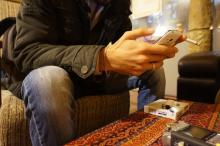
Hassan, a chain-smoking 20-year-old from Syria, sits in a cafe across the border from his homeland, one of thousands who escaped the clutches of the Islamic State group.
Not so long ago, he was one of their recruits, having undergone four months of religion training where he learned how to pray and read the Quran, while at the same time patrolling the rebel stronghold’s checkpoints.
“We loved them so much,” said Hassan, who was not willing to be identified by his real name for fear of retribution against family members still in Syria. “They gave us so much information and taught us very sweet things about Islam.”
But then things started to change.
As the Islamic State group grew in power, he saw more orders to target members of other widely popular Sunni rebel groups. At checkpoints, Hassan said, recruits were commanded to arrest or kill any members affiliated with the Free Syrian Army, an umbrella of rebel groups that he and his family supported.
His mother, who was growing increasingly disgruntled with the Islamic State’s strict rules, confronted him. “‘Why are you doing this?'” he said she told him. ‘”This is wrong.'”
It wasn’t long after, as intense fighting broke out with another Islamist brigade, Ahrar ash-Sham, that Hassan decided to stop fighting for the Islamic State.